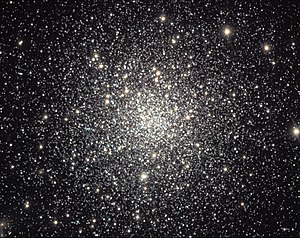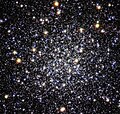M12 (球狀星團)
外观
| M12(Messier 12) | |
|---|---|
 蛇夫座的球狀星團M12 | |
| 觀測數據(J2000 曆元) | |
| 分類 | IX[1] |
| 星座 | 蛇夫座 |
| 赤經 | 16h 47m 14.18s[2] |
| 赤緯 | –01° 56′ 54.7″[2] |
| 距離 | 16.44 ± 0.16 kly(5.04 ± 0.05 kpc)[3] |
| 視星等 (V) | 6.7[4] |
| 視直徑(V) | 16.0′ |
| 物理性質 | |
| Mass | 8.7×104[5] M☉ |
| 半徑 | 37.2 ly[NB 1] |
| 金屬量 | –1.14[6] dex |
| 估計年齡 | 13.8 ± 1.1 Gyr[3] |
| 其它名稱 | NGC 6218[7] |
M12或Messier 12,也稱為NGC 6218,是在星座蛇夫座的一個球狀星團。它是由法國天文學家夏爾·梅西耶於1764年5月30日發現的,他將其描述為「沒有恆星的星雲」[8]。在黑暗的條件下,用雙筒望遠鏡可以看到這個微弱地星團。解析恆星成員需要一架孔徑為8英寸(20厘米)或更大的望遠鏡[9]。使用10英寸(25 cm)望遠鏡,顆粒核的直徑為3′(弧分),周圍環繞著10′的恆星暈[8]。
M12大致位於星團M10的西北方3°[9],在恆星列肆二(蛇夫座λ)°東南偏東,相距5.6°。它也位於6等星列肆增四(蛇夫座12)的附近[10]。星團距離地球16,400光年(5,000秒差距)[3],空間的直徑約為75光年。M12最亮的恆星視星等為12等。M10和M12彼此間的距離只有幾千光年,星團互看對方的是星等大約都是4.5等[10],在夏普力-索耶集中度分類法的評級為IX[1],是一個鬆散的球狀星團,因而曾經被認為是一個緊密集中的疏散星團。在這個星團中已經記錄了13顆變星。M12正以16公里/秒的速度向我們逼近[11]。

2006年發表的一項研究得出結論,該星團的低質量恆星數量異常少。作者推測,它們是通過穿過銀河系相對富含物質的平面而被從星團中剝離出去的[12]。
相關條目
[编辑]註解
[编辑]- ^ 線半徑 = 距離 × sin(角直徑/ 2 ) = 37.2 光年
參考資料
[编辑]- ^ 1.0 1.1 Shapley, Harlow; Sawyer, Helen B., A Classification of Globular Clusters, Harvard College Observatory Bulletin, August 1927, 849 (849): 11–14, Bibcode:1927BHarO.849...11S.
- ^ 2.0 2.1 Goldsbury, Ryan; et al, The ACS Survey of Galactic Globular Clusters. X. New Determinations of Centers for 65 Clusters, The Astronomical Journal, December 2010, 140 (6): 1830–1837, Bibcode:2010AJ....140.1830G, S2CID 119183070, arXiv:1008.2755
 , doi:10.1088/0004-6256/140/6/1830.
, doi:10.1088/0004-6256/140/6/1830.
- ^ 3.0 3.1 3.2 Gontcharov, George A.; Khovritchev, Maxim Yu; Mosenkov, Aleksandr V.; Il'In, Vladimir B.; Marchuk, Alexander A.; Savchenko, Sergey S.; Smirnov, Anton A.; Usachev, Pavel A.; Poliakov, Denis M. Isochrone fitting of Galactic globular clusters – III. NGC 288, NGC 362, and NGC 6218 (M12). Monthly Notices of the Royal Astronomical Society. 2021, 508 (2): 2688–2705. arXiv:2109.13115
 . doi:10.1093/mnras/stab2756.
. doi:10.1093/mnras/stab2756.
- ^ M12. SEDS Messier Catalog. [27 April 2022]. (原始内容存档于1 July 2022).
- ^ Marks, Michael; Kroupa, Pavel, Initial conditions for globular clusters and assembly of the old globular cluster population of the Milky Way, Monthly Notices of the Royal Astronomical Society, August 2010, 406 (3): 2000–2012, Bibcode:2010MNRAS.406.2000M, S2CID 118652005, arXiv:1004.2255
 , doi:10.1111/j.1365-2966.2010.16813.x. Mass is from MPD on Table 1.
, doi:10.1111/j.1365-2966.2010.16813.x. Mass is from MPD on Table 1.
- ^ Forbes, Duncan A.; Bridges, Terry, Accreted versus in situ Milky Way globular clusters, Monthly Notices of the Royal Astronomical Society, May 2010, 404 (3): 1203–1214, Bibcode:2010MNRAS.404.1203F, S2CID 51825384, arXiv:1001.4289
 , doi:10.1111/j.1365-2966.2010.16373.x.
, doi:10.1111/j.1365-2966.2010.16373.x.
- ^ M 12. SIMBAD. 斯特拉斯堡天文資料中心.
- ^ 8.0 8.1 Thompson, Robert Bruce; Thompson, Barbara Fritchman, Illustrated guide to astronomical wonders, DIY science O'Reilly Series, O'Reilly Media, Inc.: 137, 2007, ISBN 978-0596526856.
- ^ 9.0 9.1 Monks, Neale, Go-To Telescopes Under Suburban Skies, Patrick Moore's Practical Astronomy Series, Springer: 118, 2010, ISBN 978-1441968500.
- ^ 10.0 10.1 O'Meara, Stephen James; Levy, David H., Deep-Sky Companions: The Messier Objects, Cambridge University Press: 68, 1998 [2024-05-28], ISBN 978-0521553322, (原始内容存档于2023-09-02).
- ^ Messier 12: Gumball Globular | Messier Objects. www.messier-objects.com. 11 March 2015 [2015-08-17]. (原始内容存档于2016-03-04).
- ^ How to Steal a Million Stars?, ESO, February 7, 2006, (原始内容存档于February 8, 2007).
外部連結
[编辑]维基共享资源中相关的多媒体资源:Messier 12
- Messier 12, SEDS Messier pages (页面存档备份,存于互联网档案馆)
- Messier 12, Galactic Globular Clusters Database page (页面存档备份,存于互联网档案馆)
- 'Stolen' stars article at Universe Today (页面存档备份,存于互联网档案馆)
- Messier 12, Amateur astrophotographer (hgg) with a Celestron 9.25" (页面存档备份,存于互联网档案馆)
- WikiSky上关于M12 (球狀星團)的内容:DSS2, SDSS, GALEX, IRAS, 氢α, X射线, 天文照片, 天图, 文章和图片



